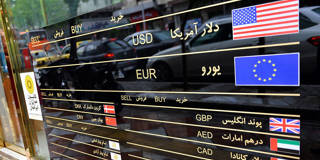A new international monetary system that ends the global dominance of the US dollar is both necessary and desirable. But to anticipate what might come next, one first must understand the political and economic dynamics that give rise to international currencies in the first place.
- Benjamin J. Cohen, Currency Statecraft: Monetary Rivalry and Geopolitical Ambition, University of Chicago Press, 2019.
Barry Eichengreen, Arnaud Mehl, and Livia Chitu, How Global Currencies Work: Past, Present, and Future, Princeton University Press, 2018.
LONDON – The Bretton Woods international monetary system that came into being after World War II was based on a set of clear rules. The US dollar stood at the system’s center, and other countries pegged their currencies to it. The US promised that central banks’ dollar holdings would be convertible into gold at a fixed price, and the International Monetary Fund oversaw the system to make sure that everyone followed the rules.
Although this was a rules-based system, there was, almost from the very start, dissatisfaction among scholars about the way it functioned. Numerous conferences were organized to air criticism of the system and to explore ambitious proposals to reform it. Among the proposals that actually were implemented was the creation of a new kind of international money to replace the dollar. In 1969, the IMF introduced its special drawing rights (SDR), an international reserve asset that is now based on a basket of five leading currencies (the US dollar, the euro, pound sterling, Japanese yen, and, since October 2016, Chinese renminbi). But the SDR has never really gained ground as an international reserve currency, and it certainly has never come close to rivaling the dollar.
In any case, the Bretton Woods system (so named for the New Hampshire hamlet where the negotiations establishing the IMF and World Bank took place) came crashing down between 1971-1973, when the US ended dollar convertibility. In the new monetary “system” that emerged, formal agreed rules disappeared and raw national power prevailed. For a time, even academic economists seemed to lose all interest in explaining, let alone reforming, the international monetary system.

Barry Eichengreen, Arnaud Mehl, and Livia Chitu, How Global Currencies Work: Past, Present, and Future, Princeton University Press, 2018.
LONDON – The Bretton Woods international monetary system that came into being after World War II was based on a set of clear rules. The US dollar stood at the system’s center, and other countries pegged their currencies to it. The US promised that central banks’ dollar holdings would be convertible into gold at a fixed price, and the International Monetary Fund oversaw the system to make sure that everyone followed the rules.
Although this was a rules-based system, there was, almost from the very start, dissatisfaction among scholars about the way it functioned. Numerous conferences were organized to air criticism of the system and to explore ambitious proposals to reform it. Among the proposals that actually were implemented was the creation of a new kind of international money to replace the dollar. In 1969, the IMF introduced its special drawing rights (SDR), an international reserve asset that is now based on a basket of five leading currencies (the US dollar, the euro, pound sterling, Japanese yen, and, since October 2016, Chinese renminbi). But the SDR has never really gained ground as an international reserve currency, and it certainly has never come close to rivaling the dollar.
In any case, the Bretton Woods system (so named for the New Hampshire hamlet where the negotiations establishing the IMF and World Bank took place) came crashing down between 1971-1973, when the US ended dollar convertibility. In the new monetary “system” that emerged, formal agreed rules disappeared and raw national power prevailed. For a time, even academic economists seemed to lose all interest in explaining, let alone reforming, the international monetary system.